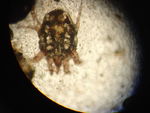Difference between revisions of "Psoroptes cuniculi"
| Line 6: | Line 6: | ||
| Ears | | Ears | ||
|- | |- | ||
| + | |} | ||
| + | |||
| + | ==Scientific Classification== | ||
| + | |||
| + | {| cellpadding="10" cellspacing="0" border="1" | ||
| + | | Class | ||
| + | | Arachnida | ||
| + | |- | ||
| + | | Order | ||
| + | | Acariformes | ||
| + | |- | ||
| + | | Family | ||
| + | | Psoroptidae | ||
|} | |} | ||
Revision as of 15:50, 26 July 2010
| Also known as: | Ear canker mite |
| Predilection site | Ears |
Scientific Classification
| Class | Arachnida |
| Order | Acariformes |
| Family | Psoroptidae |
Psoroptes cuniculi is a non-burrowing parasite, seen worldwide. It is found on the ears of the infected host, is generally seen in relatively small amounts. However, occassionally they will proliferate and the infection will become severe leading, resulting in mange.
Hosts
Commonly of rabbits, but also seen in rabbits, goats, sheep and horses.
Identification
Adults mite grow up to around 0.75mm in length. The legs are long and jointed, bearing suckers on the ends. The adults also have very characteristic pointed mouthparts.
It is highly likely that P. cuniculi is simply an adaptation of the species Psoroptes ovis.
Life Cycle
The egg hatches forming an hexapod larvae. The larvae then moults forming a protonymph, which further moults to form a tritonymph, which then moults to become an adult. Each stage takes around two days, totalling to an approximate 10 day life cycle.
